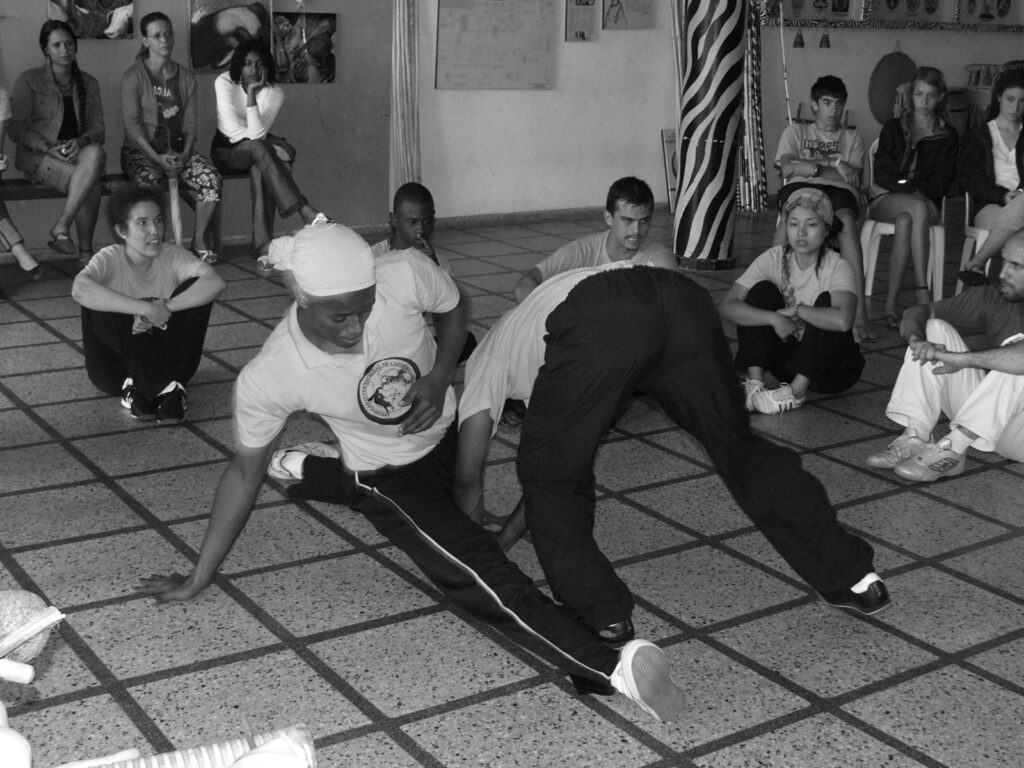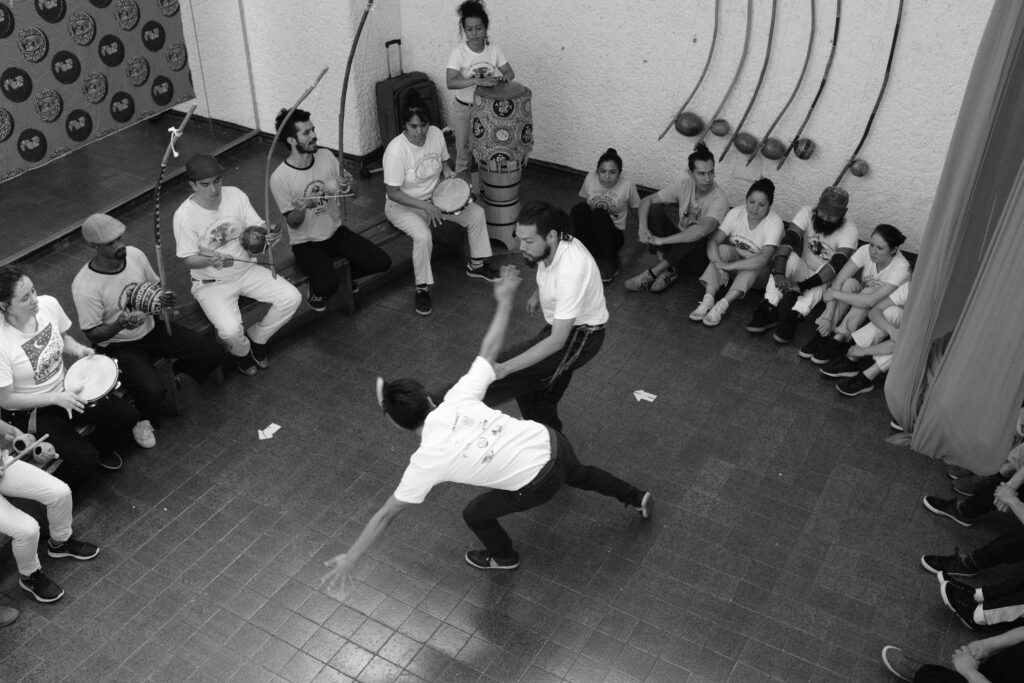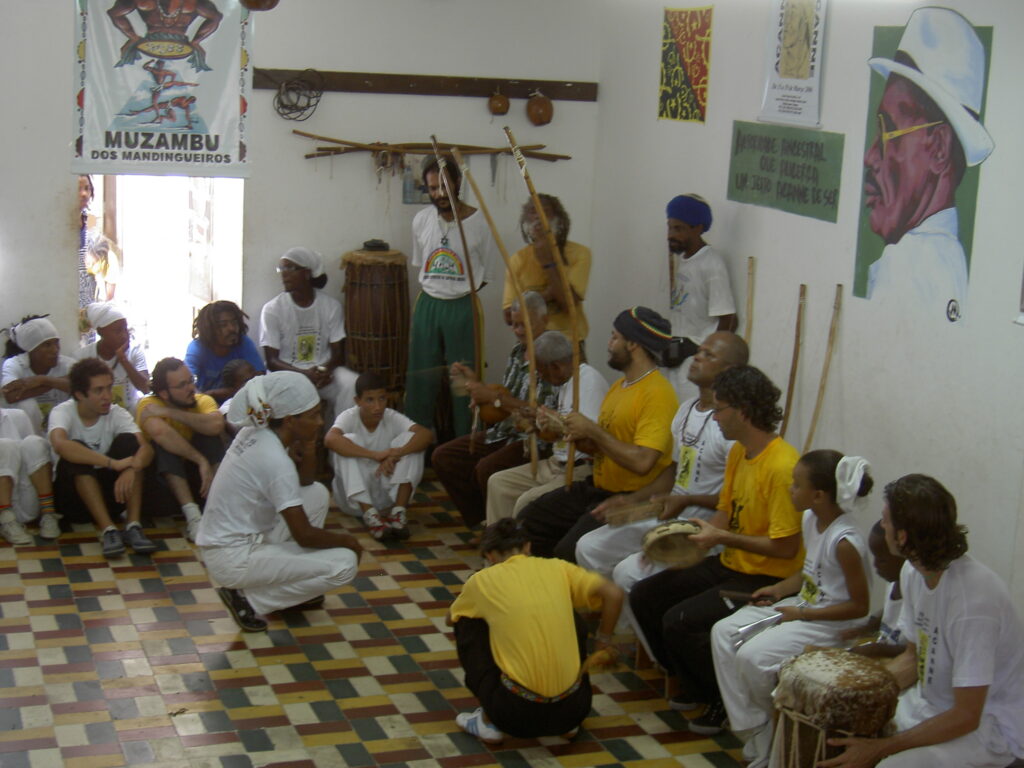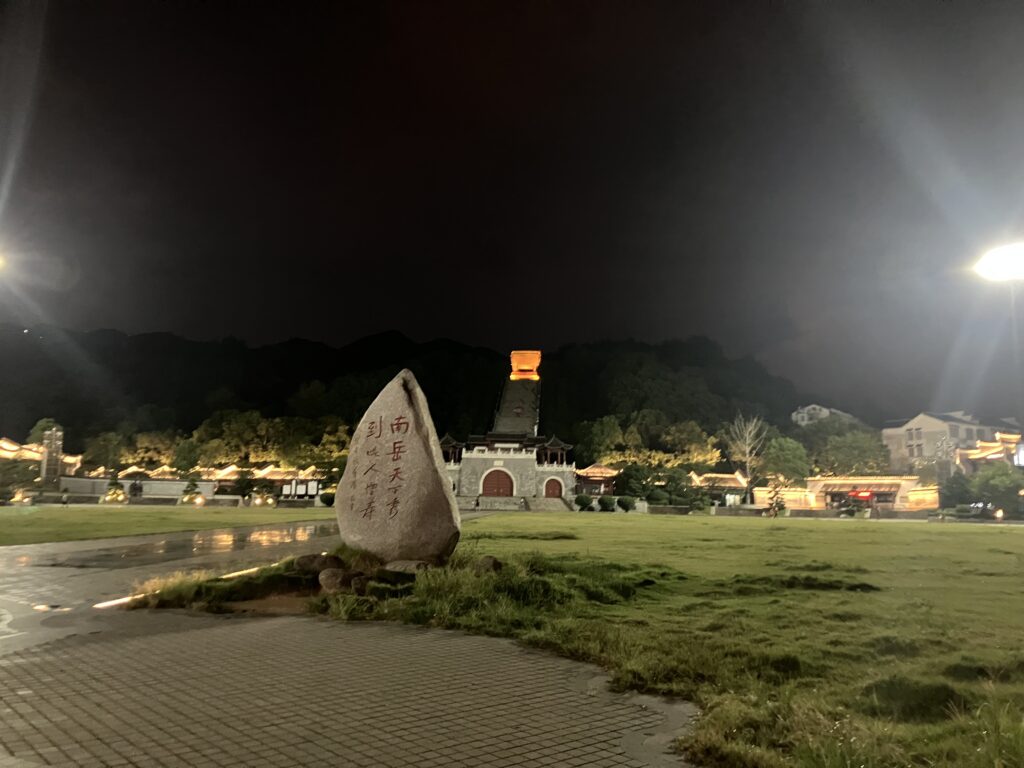Sergio González Varela
Capoeira is an Afro-Brazilian ritual that combines elements of martial arts, music, and playfulness. Introduced by slaves in Brazil in the seventeenth century during the colonial period, it maintains strong connections to Africa and the African diaspora. Performed by two practitioners known as players within a circle or combat ring called a roda, capoeira is accompanied by live music performed by other practitioners. This Afro-Brazilian ritual typically takes place in enclosed spaces called academies, which serve as centers for learning and training. However, gatherings can also occur in public events or on the streets.
Capoeira is divided into three main styles: Regional (focused on competition), Contemporânea (which combines combat fighting with acrobatics and dance), and Angola (based on respecting and following Afro-Brazilian traditions). I have been studying capoeira Angola for over twenty years, and like most academics in the field, I am also a practitioner. I was drawn to capoeira Angola because of its cultural aspects and spirituality.

During my time as a fellow at CAS-E, I had the privilege of exploring diverse esoteric practices from various disciplines beyond anthropology. This enriching experience has broadened my perspective, allowing me to approach capoeira with a newfound understanding that its spiritual and esoteric elements may hold a more significant role than I had previously anticipated. In my presentation, I discussed the concept of cosmological power and the unnamed, describing the difficulties of expressing with words the intense experience of practitioners, which appears to lie beyond rationality. Furthermore, I emphasized the significance of the leaders, known as mestres, in transmitting the knowledge and secrets of capoeira.
The central argument revolved around the limits of knowledge and the concept of apprenticeship. This is a crucial question for anthropologists, as it directly impacts the fieldwork methodologies we employ. Ethnography involves deep connections and relationships with other people, but we cannot deceive ourselves about going native; it does not matter how long we have been part of a ritual or a community of practitioners, we cannot become other and lose our identities completely. It is an impossibility as we cannot get rid of our cultural baggage and conventions. This limitation in achieving complete objective ethnographic understanding of others highlights the inherent limitations of anthropology in providing an account of “true” objectivity.
Instead, we should acknowledge that there are aspects of the people we relate to in the field that we will never truly understand. This is not merely a political issue but also an existential one. How can I empathize with the pain and suffering of others? What is my role as an analyst and as a person? Can I separate these two domains? Are anthropological dilemmas merely a matter of effective communication, metatheoretical explanations, and cognitive processes?

Although I cannot speak for my capoeira interlocutors, long-term fieldwork has allowed me to gain insights into the perspectives of the leaders, the mestres. To them, the world is a world of appearances and deceptions that demands to be uncovered and revealed. For them, capoeira is not just a physical practice but encompasses everything they do and perceive beyond the roda. As Mestre Moraes, one of the most renowned capoeira mestres, told me once, “Everyone can be a player of capoeira, but only a select few can truly become a capoeirista.” This profound statement has resonated with me for years. It implies that everyone can learn capoeira, but only a privileged few can grasp its essence and transform it into a profound way of life. It is important to mention that not everyone can become a mestre. Some people abandon capoeira due to various life commitments, while others become disillusioned or lose faith in their leaders. Injuries are another reason why some people quit.
Understanding capoeira takes a long time and dedication, often spanning decades. It takes patience, self-discipline, and a willingness to listen rather than constantly asking questions. In the Angola style, there are no clear winners or losers. Instead, it’s all about simulating interactions and using physical acts of cunning and deception to show the vulnerabilities of an opponent. Mestres still find ambiguity about the morality of deception baffling, even the most experienced practitioners hesitate about how far they should take it in their social relationships. However, for them, capoeira is holistic, and they use deception as a guiding philosophy to navigate a treacherous world.
Today, more leaders are seeking to transform capoeira into a religious movement, transcending its association with Afro-Brazilian religions like Candomblé and Umbanda. Over the years, some renowned teachers have embraced Catholicism, Pentecostalism, and even the Evangelical movement. These teachers reject any connection to Afro-Brazilian religions, viewing them as “a thing of the devil.” Consequently, they avoid referring to them in music, body protection practices, and the existing dietary restrictions and dress code within the academies. Nevertheless, these leaders emphasize the spiritual aspect of capoeira alongside their other religious views. This coexistence is intriguing because it is one of the reasons why many people from different backgrounds gather in the roda to commune. As leaders strive to transcend religious differences so that everyone can come together and play, it has paradoxically transformed capoeira into a self-absorbing practice. In this practice, the energies of the ancestors feel alive, and the dead mestres serve as omniscient witnesses to the gatherings. This explains why leaders think they are performing for the ancestors, their most demanding audience.

These spiritual presences are accompanied by a cosmological concept of personal power, which is condensed in the concept of mandinga. Mandinga refers to the charismatic and esoteric power of an individual, representing the ineffable force that a mestre accumulates through time and dedication. Mandinga, a concept difficult to define, is primarily experienced in the body and manifested through deception. During my involvement in capoeira, I have witnessed glimpses of this power when mestres interact with each other in the roda or when they play music together. In these moments, it becomes possible to comprehend the spiritual and energetic intensity of the roda as something tangible, transcending mere language metaphors.
The energetic intensityflows to the outside world of living experience. For practitioners, this is crucial because capoeira should be a tool to transform the world. Deception, spiritual power, and mandinga empower individuals to confront the challenges of daily life and learn how to resist and fight against inequalities and discrimination. These qualities represent a form of power of the weak in Brazilian society, those who have been stripped of agency. For many Afro-Brazilian practitioners and people of other ethnic minority backgrounds worldwide, capoeira is interpreted as an art of resistance.
In conclusion, I propose that deception and the presence of ancestors have become integral components of a spirituality that seeks to transform life, deconstruct the physical body, and bring individuals closer to a cosmological form of power. This spirituality also seeks to establish networks of solidarity among diverse societal sectors. Over time, capoeira Angola may further distance itself from other styles, ultimately becoming a strictly religious practice. Some of these transformations are already occurring in various groups in Brazil and internationally, where capoeira Angola is transforming into a force of spiritual development and individual self-discovery to act in a treacherous world.
#
Dr. Hab. Sergio González Varela, Visiting Fellow, Center for Advanced Studies in the Humanities and Social Sciences, Friedrich-Alexander-Universität Erlangen-Nürnberg, Germany. He is an Assistant Professor of Anthropology at the Institute of Ethnology and Cultural Anthropology of the University of Warsaw, Poland. His research topics deal with Afro-Brazilian culture, the anthropology of ritual, religion, performance, tourism, art, and globalization. He is the author of the books, Resistir: Hacia Una Antropología de la Relisiencia (forthcoming 2025), El Arte de Engañar: Ensayos de Antropología Social (2022), Capoeira, Mobility and Tourism: Preserving an Afro-Brazilian Tradition in a Globalized World (2019), Entre Dos Mundos: La Antropología Radical de Paul Stoller (2018), and Power in Practice: The Pragmatic Anthropology of Afro-Brazilian Capoeira (2017).
____
CAS-E blogs may be reprinted with the following acknowledgment: “This article was published by CAS-E on July 22nd, 2025.”
The views and opinions expressed in blog posts and comments made in response to the blog posts are those of the author(s) and do not necessarily reflect the views and opinions of CAS-E, its founders, its staff, or any agent or institution affiliated with it, nor those of the institution(s) with which the author is affiliated.








